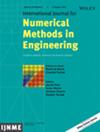Sequential Maximal Updated Density Parameter Estimation for Dynamical Systems With Parameter Drift
Abstract
We present a novel method for generating sequential parameter estimates and quantifying epistemic uncertainty in dynamical systems within a data-consistent (DC) framework. The DC framework differs from traditional Bayesian approaches due to the incorporation of the push-forward of an initial density, which performs selective regularization in parameter directions not informed by the data in the resulting updated density. This extends a previous study that included the linear Gaussian theory within the DC framework and introduced the maximal updated density (MUD) estimate as an alternative to both least squares and maximum a posterior (MAP) estimates. In this work, we introduce algorithms for operational settings of MUD estimation in real- or near-real time where spatio-temporal datasets arrive in packets to provide updated estimates of parameters and identify potential parameter drift. Computational diagnostics within the DC framework prove critical for evaluating (1) the quality of the DC update and MUD estimate and (2) the detection of parameter value drift. The algorithms are applied to estimate (1) wind drag parameters in a high-fidelity storm surge model, (2) thermal diffusivity field for a heat conductivity problem, and (3) changing infection and incubation rates of an epidemiological model.

 求助内容:
求助内容: 应助结果提醒方式:
应助结果提醒方式:


